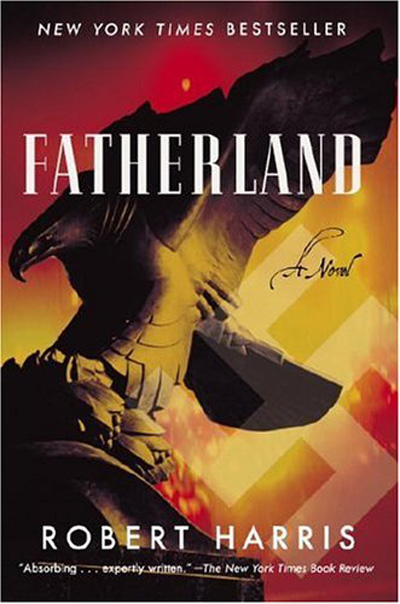A body fished out of a lake. A spate of unexplained high-profile murders. An oppressive totalitarian state following your every move. A beautiful female accomplice. A trusted friend who betrays you to the authorities. Admittedly, this all does sound like elements of any stale thriller novel, capable of being procured by any mug overdosed on Enemy of the State or 007 (Dan Brown did write Angels and Demons after all). Yet Fatherland by Robert Harris is a novel that will both impress and entertain its readers. It doesn’t hurt that the book also addresses one of the most popular themes of alternate history circles and associated literature: a Nazi victory in the Second World War.

Fatherland is set in a 1960s Germany that never was. Hitler’s empire has emerged victorious, stretching from Alsace-Lorraine to the Crimea and the Urals, and surrounded by subject European nations to the West. However, despite its outward vigor, the Third Reich still faces a host of daunting challenges from inside and out. From outside, it is locked in a nuclear stalemate with the United States, while American-armed Soviet guerillas continue to grind against the hinterlands. Within, the Aryan supermen, softened by years of comfort and luxury, are increasingly reluctant to fight the endless war in the east. Unable to continue combating its own problems while keeping up the arms race, there is a mood for détente with the United States.
Meanwhile, the book’s main plot follows an investigator for the Berlin criminal police, Xavier March, who is investigating the suspicious death of a high-ranking Nazi. March soon realizes that the incident is linked to the murders of several other party officials, and teams up with American journalist Charlotte ‘Charlie’ Maguire to uncover the bigger picture. Their search takes them deeper and deeper into a scandal that involves not just the murdered, but also the Gestapo (the secret police), the Führer Adolf Hitler and the German nation itself. With a summit with the Americans and Hitler’s 75th birthday soon approaching, national security is paramount, and this scandal has the potential to stop the two events dead in their tracks. The duo soon find the Gestapo hot on their trail and March, previously a respected (if less than ideal) citizen, finds himself labeled an outright “enemy of the state.”
It must be mentioned here that the novel’s plot itself is less than original, echoing the same theme in George Orwell’s Nineteen-eighty-four or Aldous Huxley’s Brave New World: that of the undesirable loner, pitted against the totalitarian, conformist regime. Indeed, Xavier March is similar – even outright identical - to Nineteen-eighty-four‘s Winston Smith; his growing feelings of exclusion, his rejection by society at large - the piteous “I can’t fit in” moments – can ring quite hollow in an emotional context. However, trivial similarities aside, the book’s main flaw is that the ‘huge political scandal’ around which the entire plot hinges is, at least in our timeline, actually a well known feature of Nazi policy. Thus, some momentum initially carried by the novel’s vast setting and political intricacies is lost; disappointment comes with the less-than-groundbreaking revelation at the end (Think Da Vinci Code: Audrey Tatou is the direct descendant of Christ!).
Yet for all its flaws, Fatherland is a very effective thriller novel. This is not because of an outstanding narrative or an original plot, but is by virtue of its setting: smack-dab in the middle of Hitler’s National Socialist Empire. If Nineteen-eighty-four‘s setting was a purely conjectural fantasy regime, Fatherland is very real – as real as the Second World War still is in the minds of many. The resultant ominous atmosphere is probably the novel’s most interesting and rewarding characteristic. A lot of the chapters simply follow March as he goes about his investigation, looking through old files, searching people’s houses, or attending meetings or interrogations. Boring? No. This is Nazi Germany, where March’s every “asocial” action, every investigation he shouldn’t undertake, accumulates in a Gestapo file deep underground. The tone of the book makes this horribly clear.
The realism that this book strives for is not limited to its description of Nazi society for the individual, as the reader may have gathered from the above plot summary. Harris has skillfully integrated his own historical and diplomatic insight into the narrative. History buffs will be pleased with the plausible account of an alternate timeline, and those into international politics will be satisfied that this book offers many interesting points paralleling our world’s own Cold War diplomacy. The average reader, however, may rest assured that this book does not take up most of its pages explaining the trivialities of the National Socialist history, whether real or fictional. All in all, Fatherland is an enjoyable and entertaining thriller, and, although no masterpiece, surely deserving of its venerable title as one of 1992’s bestsellers.

